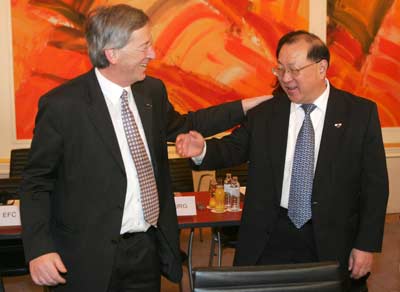VIENNA, Austria - EU and Asian officials said Sunday they would like to see
China's currency become more flexible but stepped back from demanding Beijing
revalue the yuan.
U.S. officials have urged China to revalue its currency, saying the yuan is
undervalued by up to 40 percent and gives an unfair advantage to China's
manufacturers at the expense of American competitors.

Luxembourg's Prime Minister Jean-Claude Juncker (L) talks with
China's Finance Minister Jin Renqing during an ASEM Finance Ministers'
meeting in Vienna April 9, 2006. Asian and European Finance Ministers met
to discuss issues concerning globalisation on Sunday.
[Reuters] |
In a statement at the end of two days of talks, EU and Asian finance
ministers did not mention exchange rates although they stressed the need to cut
global imbalances to ensure "stable and sustainable conditions" for world
economic growth.
Asian Development Bank President Haruhiko Kuroda told reporters that, in his
personal view, only a gradual currency adjustment would suit a country like
China which is still moving from a state-controlled economy.
"If you maintain too long an exchange rate which does not reflect economic
fundamentals, that could create problems," he said. "I still think that a more
flexible yuan would be in the interests of the Chinese economy."
Austrian Finance Minister Karl-Heinz Grasser — who led the talks — said both
the European Union and the United States expected to see more flexibility on
important Asian currencies.
"I think that ... a more gradual flexibility of the yuan would be a good
thing to have in order to also try to work on the reduction of the global
imbalances," he told reporters.
Kuroda said China's foreign exchange reserves increased by more than $200
billion last year, thanks largely to state intervention in the exchange market.
The EU's largest trade deficit by far is with China, hitting 106 billion
euros ($128 billion) last year, up a third on 2004. The U.S. trade surplus with
China is even larger and hit a record $202 billion last year.
EU Economic and Monetary Affairs Commissioner Joaquin Almunia — who
supervises EU states' budgets — said every major player in the global economy
had work to do to cut what ministers termed "persistently large global
imbalances."
He said the U.S. needed to increase domestic savings, Asian economies "in
particular China" should boost domestic demand while Japan and Europe have to
press on with structural reforms to their economies.
High and volatile oil prices and emerging protectionist tendencies could risk
world growth, ministers warned, highlighting that a bird flu pandemic could also
be very costly to Asia.
Finance ministers from 13 Asian countries — Brunei, Cambodia, China,
Indonesia, Japan, Laos, Malaysia, Myanmar, the Philippines, Singapore, South
Korea, Thailand and Vietnam — met counterparts from European nations and EU
officials on Saturday and Sunday.
The talks — which pave the way for a meeting between Asian and EU leaders in
Finland next September — were led by Austria which currently holds the six-month
rotating presidency of the European Union. They agreed that South Korea should
host the next Asia-Europe meeting in 2008.